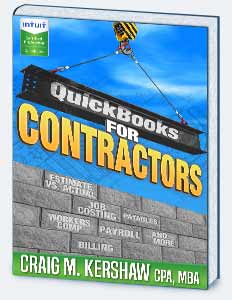Keeping track of the myriad of details necessary to run a successful contracting or construction business can seem to be a daunting task. Specialized software tailored for the construction industry is available, although many of these packages can run well over $10,000. Fortunately for smaller companies that can’t afford such an expense, QuickBooks can be a very viable solution. QuickBooks has numerous features and reports, and can be customized to fit each contractor’s unique situation. Knowing what these features are and getting the most out of QuickBooks can make a significant impact towards your success.
What can QuickBooks do for the Contractor?
Generate Profit and Loss Statements and Balance Sheets tailored for your business and put you in the best light for banks and sureties
Extensive reporting on job profitability
- P & L by job
- Summary job profitability reports
- Detail job profitability reports including estimate to actual
Allow you to prepare detailed estimates for presentation to customers
Job costing of all elements of cost – payroll, fringes/burden, subcontractors, materials, equipment, insurances and overhead
Compare actual job costs against estimated costs with variances as jobs progress
Complete payroll processing
- Track/charge employee time to jobs
- Import time from third party time clock systems
- Generate paychecks and direct deposits
- Charge jobs for payroll taxes, fringes, and overhead
- Tracking of workers compensation – by state and class code
- Prepare weekly certified payroll reports
- On line tax filings and payments
- Emailing or online availability of deposit advices for employees, eliminating the need to hand out paychecks
- Generation of year end W-2’s
Billings to customers and tracking of collections – deposits, progress billings, retention
Processing purchase orders and paying payables for subcontractors and vendors
Prepare 1099’s for subcontractors at year end
Tracking equipment costs by piece of equipment and allocation of costs to jobs
Inventory management and accounting, charging materials to jobs and tracking quantities on hand
For government contractors, creating cost “pools” of indirect costs for allocation to jobs
About the author – Craig Kershaw, CPA/MBA is the managing partner of The CFO Source, which provides CFO/Controller services, tax preparation and planning, and bookkeeping and payroll services to small and medium size businesses. A QuickBooks Pro Advisor, Craig is the author of QuickBooks for Contractors and QuickBooks for the Advanced User. Craig is also a QuickBooks instructor for the Maryland Association of CPA’s.

